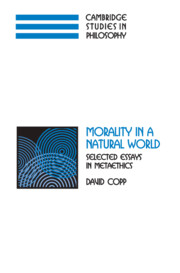Book contents
- Frontmatter
- Contents
- Preface
- Acknowledgments
- Introduction
- Part One Naturalism: Epistemology and Metaphysics
- 1 Why Naturalism?
- 2 Four Epistemological Challenges to Ethical Naturalism: Naturalized Epistemology and the First-Person Perspective
- 3 Moral Naturalism and Self-Evident Moral Truths
- 4 Moral Necessities in a Contingent World
- Part Two Referring to Moral Properties
- Part Three Naturalism and Normativity
- Index
- References
3 - Moral Naturalism and Self-Evident Moral Truths
Published online by Cambridge University Press: 19 July 2009
- Frontmatter
- Contents
- Preface
- Acknowledgments
- Introduction
- Part One Naturalism: Epistemology and Metaphysics
- 1 Why Naturalism?
- 2 Four Epistemological Challenges to Ethical Naturalism: Naturalized Epistemology and the First-Person Perspective
- 3 Moral Naturalism and Self-Evident Moral Truths
- 4 Moral Necessities in a Contingent World
- Part Two Referring to Moral Properties
- Part Three Naturalism and Normativity
- Index
- References
Summary
THE ISSUE
It is intuitively plausible that there are substantive moral propositions that are ‘self-evident.’ It is plausible, for example, that, “other things equal, it is wrong to take pleasure in another's pain, to taunt and threaten the vulnerable, to prosecute and punish those known to be innocent, … to sell another's secrets solely for personal gain,” and “to torture others just for fun.” It is plausible that these propositions are true, and it is plausible that they are self-evident. In what follows, I refer to them as “the common sense principles.” And I will call the thesis that some such propositions are self-evident “the self-evidence thesis.”
It is not entirely clear how to understand the idea of a self-evident proposition. Intuitively, a self-evident proposition is one that is obviously true without the need for any proof or argument. But the term “self-evident” is used as a technical term in philosophy, and philosophers have meant different things by it. Russ Shafer-Landau, who gives the common sense principles as examples, proposes a stipulative definition. Expressed informally, his idea is that “once one really understands” the common sense principles, “(including the ceteris paribus clause),” one is justified in believing them. Robert Audi proposes a somewhat different definition. He suggests that a self-evident proposition is such that anyone who “adequately understands” it would be justified in believing it and would know it if he believed it on the basis of this understanding.
- Type
- Chapter
- Information
- Morality in a Natural WorldSelected Essays in Metaethics, pp. 93 - 112Publisher: Cambridge University PressPrint publication year: 2007
References
- 2
- Cited by

